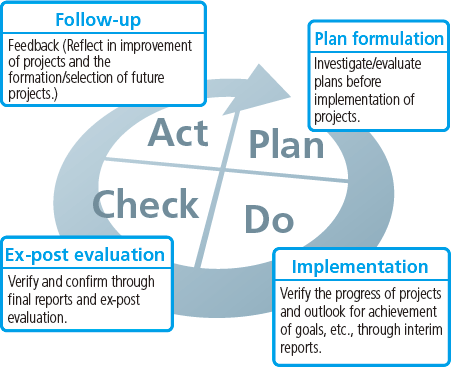Japan's Official Development Assistance White Paper 2011
3. Requirements for Implementation of Strategic and Effective Assistance
(1) Enhancement of Evaluation
In order to implement ODA more effectively and efficiently, there is a need for its continuous improvement by reflecting accurate understanding of the implementing process and its effects. To this end, MOFA, other related ministries, and JICA conduct monitoring and evaluation of ODA.
ODA evaluation is positioned within the framework of PDCA cycle (Plan, Do, Check, Act). The lessons and recommendations gained from the evaluation results are conveyed to the relevant departments and the governments of recipient countries in order to utilize them in future planning and implementation process. In addition, it is important to explain to the Japanese people how ODA is used and what effects have been achieved. Thus, the Government publishes the results of ODA evaluations through websites in order to fulfill its accountability.
Currently, MOFA mainly implements evaluations on policy-level (country policy evaluations and priority issue evaluations) and evaluations on program-level (aid scheme evaluations), while JICA implements evaluations on program-level (thematic evaluations, etc.) and project-level. Policy and program-level evaluation implemented by MOFA are made following the five evaluation criteria (relevance, effectiveness, efficiency, impact, and sustainability) of the Development Assistance Committee (DAC), and assess whether relevant policies have been taken, whether the development effect has been increased by the assistance, and whether the process of implementing assistance has been appropriate. To secure its objectivity and transparency, evaluations are conducted by third parties. MOFA makes continuous efforts to improve the ODA evaluation systems. To further increase the independence of evaluation, the ODA Evaluation Division was transferred from the International Cooperation Bureau, which implements assistance, to the Minister’s Secretariat, in addition to appointing an external evaluation specialist as the Director of the Division.
Meanwhile, JICA implements evaluations on each technical cooperation, loan aid, and grant aid project as well as on its theme. In addition to conducting consistent evaluations from pre-implementation stage, implementation stage, to post implementation stage, JICA has established consistent evaluation mechanism of these three assistance modalities. These evaluations are conducted in accordance with the DAC's five evaluation criteria, with all projects that exceed a certain monetary amount being subject to ex-post evaluations by an external party.
MOFA also conducts policy evaluations on economic cooperation policies in general, ex-ante-evaluations on projects that exceed a certain amount of money, and ex-post evaluations on pending projects that have not proceeded for five years, and incomplete projects that have not concluded after ten years. These are carried out pursuant to the Government Policy Evaluations Act (the Policy Evaluation Act)*.
Counter measures developed by considering each recommendations and lessons obtained from these evaluations are reflected in future planning and implementation of ODA.
PDCA cycle

Terminology
*Pending projects/incomplete projects
"Projects that have not begun after five years" are projects for which the loan agreement has not been signed or loan disbursement has not begun after five years have elapsed since the decision was made to implement the project. "Projects that have not been completed after ten years" are projects for which loan disbursements have not been completed after ten years have elapsed since the decision was made to implement the project.
